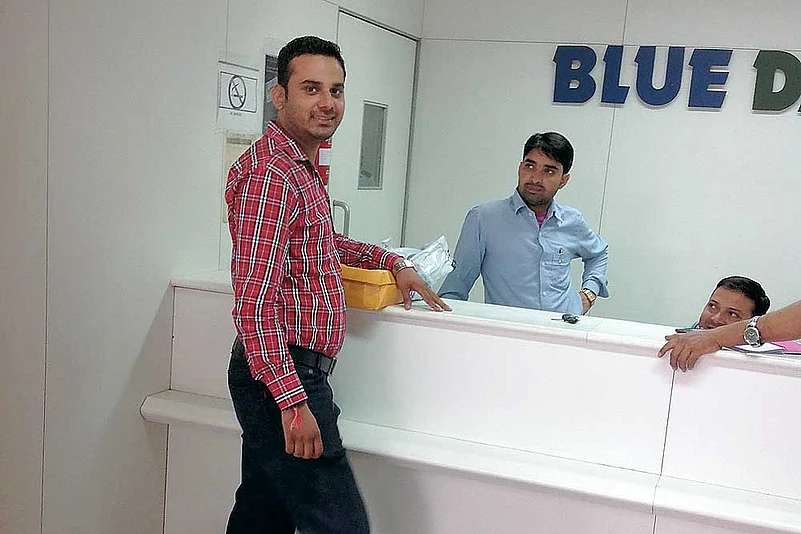Like the city, Meerut’s youngsters too are grappling with the forward pull of modernity and the restraining ties of provincialism. Cricket bats and TT racquets are passe, Meerut’s teens are now jeans-clad, online-shopping, deal-swapping youngsters who can also boldly hold forth on love jehad. They may not be sure whether this jehad is ‘real’ or ‘fake’ but they are quite certain that their pen drive, ‘LED’, mobile, shoes or sling bag are a steal online. Flipkart, Jabong, Snapdeal, Amazon—Meerut’s upwardly mobile have seen them all.
“We got WhatsApp messages to be alert about love jehad,” says Isha Chauhan, International Business student at CCS University. News of last week’s big online discount sale also came on WhatsApp—alas, five minutes before the store went out of stock. Isha has older pen drives, bags she bought from Snapdeal, stuff she simply ‘liked and clicked’. Her collegemate Atul Pandit doesn’t worry so much about LJ, he’s just into devices, shoes and discounts on Flipkart. “I paid 30 per cent less for Nike shoes in 2013,” he says. Abhinav Sharma, 29, bought an LG Plasma TV for Rs 20,500 at Flipkart’s big sale, saving Rs 3,000 over the local stores he checked.
Businessmen say they are struggling to cope with the aftermath of the buzzy online discounts since September. “What am I going to do? I am going to shut down,” says Manoj, infuriated proprietor of Meerut’s largest Samsung dealership. Scores of locals buy online but expect installation and after-sales support from his dealership. Nearby, RR Enterprises’s Rajeev Agarwal says online retail’s prices were unfairly low. “Either online people give better service than us or we must get better discounts—this isn’t going to work.” Store after store-owner says footfalls thinned 20 per cent since the online discount blitz.
Meerut’s jewellery market, the biggest in India, senses the approaching storm too. Vivek Shekhar sniffed it in the air early, taking his ML Varaniyam store online four years ago. “In the new world order, our customers are working people. They find us online, select items, check prices, pay and patiently wait for delivery. I do nothing,” he says. The jewellery business has passed from father to son, and the Shekhar family, with two gemologist daughters, beat the system by going professional, modern, online. On Wednesday, Charu Kapoor, a prominent silver jeweller, signed up to sell her wares on Snapdeal. “I just signed up today—let’s see what kind of demand is there,” she says.
Sarvesh Sarraf of Meerut Bullion Association says more must go online to net the city’s younger computer-savvy population. “But online trades are legal and traders are often loath to pay taxes. They’ll have to change,” he says. Actually, Meerut has been changing for some time now. Thanks to easy loans for homes and cars that everybody seems to want, the emi culture has mopped up the loose change of Meerut folks. The modern, outgoing city was a creation of the large military presence, huge civil administration and burgeoning education market. Tushar Nangia runs the only book store on Abu Lane, Meerut’s posh shopping district. “Flipkart delivers hundreds of books daily in Meerut. If the reading habit grows, I’ll grow. So far I just lived off the army crowd,” he says.
Flowing it is. Blue Dart gets 1,000 online deliveries every day in Meerut compared with 250-300 in 2012. “Sometimes we notice there is a wave of deliveries, especially to poorer neighbourhoods. And just as suddenly there follows a wave of refusal to accept packages,” says one delivery man. The city is still testing online waters, as relationships with retailers keep the old business models afloat. In much the same way, the city’s old Muslim population—of whom over 1.5 lakh work in various industries—is trying to keep up with what’s new.
All the talk of love jehad, says every trader, is adding to their woes. Last week, two Hindu men murdered a Hindu woman, but the incident barely led to a flutter. Nothing like the incident in September, where a ‘Tyagi girl’s’ family started the love jehad drumbeat. That’s why Sarraf stresses that a city infamous for love jehad is a bad business deal—be it physical or online. “Outsiders are reluctant to come here since all this talk started,” he says.


























